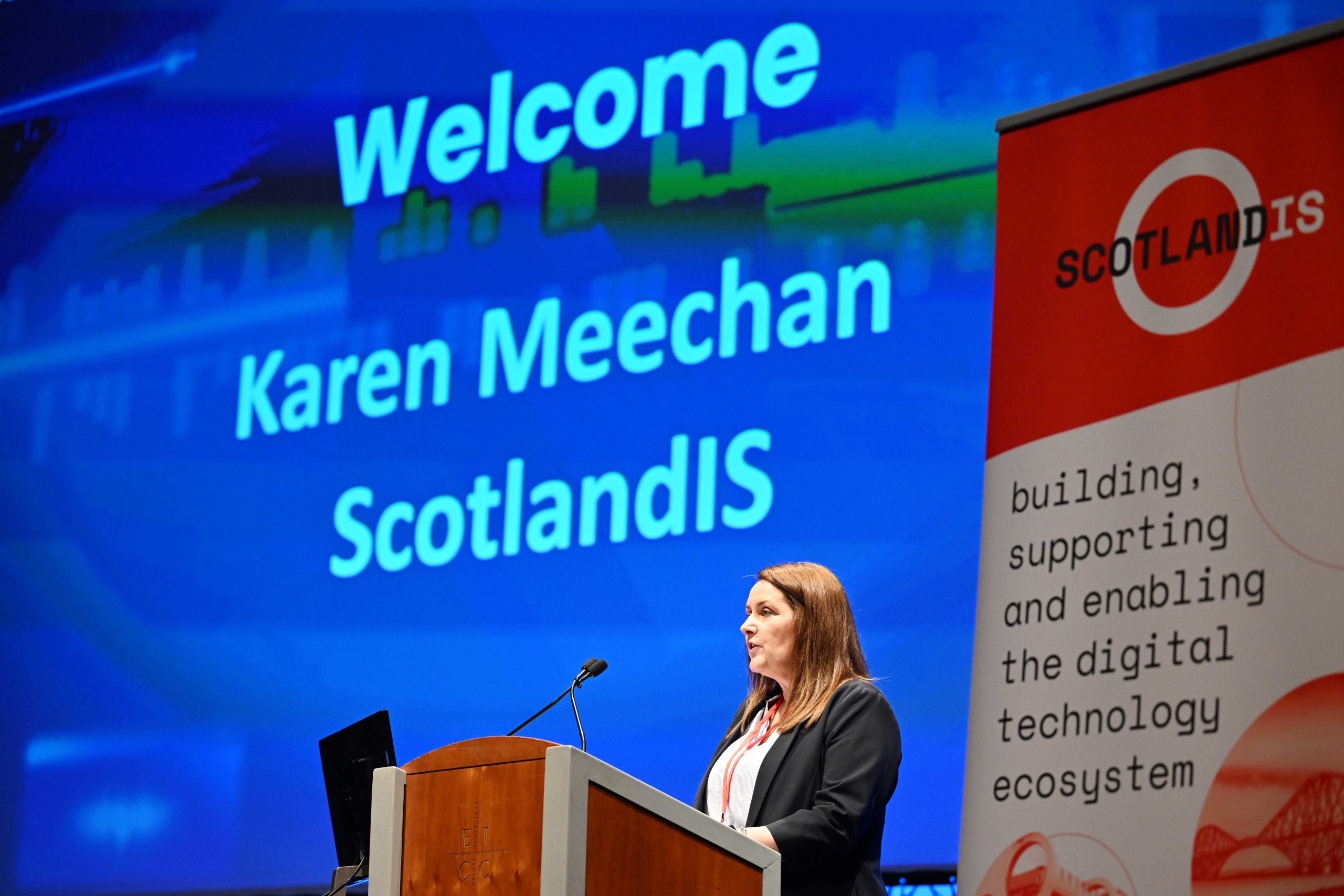“Digital underpins everything so everybody is looking for these skills now” – Karen Meechan, ScotlandIS chief executive
It’s fair to say that few aspects of modern life have escaped the digital revolution. And the arrival of artificial intelligence, the much vaunted Internet of Things and the mass accumulation of data are set to accelerate this transformation of society, for better or for worse.
ScotlandIS acts as a nerve centre for the country’s digital aims and ambitions. The statistics highlighted by the organisation are certainly impressive, and constantly on the rise. At the last count, it represented more than 1,000 companies through its cluster ecosystem, with its members employing some 60,000 people.
The economic contribution to Scotland from those firms is getting on for £5 billion out of a digital tech sector that contributes about £7.5bn to the nation’s gross value added (GVA). It is estimated that the sector is growing 1.5 times faster than the overall economy. Tellingly, the average annual salary of a digital tech worker is almost £37,000 – about a quarter higher than the national average pay.
Despite this, Scotland’s digital tech sector is facing a “very challenging” skills landscape, according to ScotlandIS’s chief executive, Karen Meechan, who is concerned that this scarcity of talent may be holding back firms’ growth ambitions.
“The sector is very optimistic and that is something that has been relatively consistent,” she observes. “But the challenge we have is that we don’t have the people to fill the roles that 78 per cent of our sector needs. We need to continue to create a pipeline of talent. Digital underpins everything so everybody is looking for these skills now.”
Meechan says the membership organisation works very closely with schools to give pupils a “bit of insight” into the opportunities out there to develop a career in the likes of software development and coding. A programme run by ScotlandIS takes industry practitioners into high schools across the country, with the aim of “marrying up pupils’ passions with some of the opportunities we have in the sector”.
Meechan, who admits to having seen “a lot of changes” in her two decades or so at the tech body, says it was “disappointing” to see the demise of CodeClan, the digital skills academy that collapsed in the wake of the pandemic. The CodeClan name and brand have since been acquired by technology incubator CodeBase.
“CodeBase have taken on an almost CodeClan 2.0 and I think the team there are working on what the next steps look like,” she adds. “We were part of those conversations and we would like to continue to be part of those conversations.”
Meechan was speaking ahead of ScotSoft2024, billed as one of Scotland’s biggest software conferences for more than 25 years, which was being held today in Edinburgh. The event also encompasses the Young Software Engineer of the Year Awards. More than 30 speakers were due to participate in sessions covering a range of subjects from AI and data to sustainability and investment opportunities.
“Ultimately, what we are trying to do is give the sector more information and greater insight into the topics that they can then take back into their businesses,” notes Meechan. “There is quite a lot happening to support start-ups, which is obviously very important as they become our future SMEs [small and medium-sized enterprises]. However, there’s not a great deal there to support those SMEs, which make up the bulk of our membership.
“We have good salaries in the sector. But, on top of not having enough people, we are also now competing on a global stage and that impacts on the bigger skills challenge that we have and we need to find a solution. If we can’t find sufficient staff then we are stunting the growth of these SMEs and they can’t deliver on new business.”
The ScotlandIS leader sees “huge opportunities” in two rapidly-expanding areas – space and renewables – with Scotland well placed to take a lead on both.
“They both require digital to function well,” she says. “In terms of the space sector, we have done a couple of white papers recently. Soon we hope to have an end-to-end space sector in Scotland – from build to launch – so there are massive opportunities and there are many of our members working in that sector already. We are just trying to make sure that we are joining the dots better.”
Artificial intelligence presents much more of an opportunity than a threat, according to Meechan, who views AI and associated technologies as “just another tool”.
“It’s not right for everyone and every service and every product,” she asserts. “I don’t think we will all be replaced by ChatGPT or by AI. I think a lot of services and products will become a bit more efficient but there will always be roles for people.”
There is a threat from cybercrime, though, with online attacks costing UK businesses an estimated £27bn annually. It’s an issue that ScotlandIS, which earlier this month unveiled Fyne Labs chief executive Andrew Williams as its new chair, is hot on.
“We have been working with industry for a number of years now on cyber resilience though you can’t 100 per cent guarantee that you are not breachable,” says Meechan. “However, there are lots of things that businesses can do that are straightforward, like two-factor authentication and undertaking cyber awareness training. There are things out there that are free to do with your teams to help be that bit more secure.”
Source: The Scotsman

